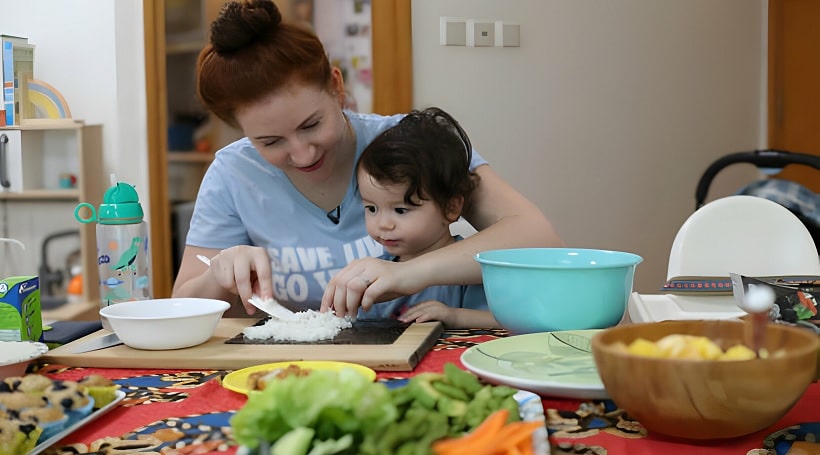Last Updated on January 1, 2025
A baby’s caloric needs vary based on age, weight, and growth rate, but on average, infants require about 50-120 calories per pound (110-220 calories per kg) of body weight per day. Newborns typically need fewer calories, while older infants need more as they grow and become more active.
Understanding the caloric needs of a baby is crucial for ensuring they receive the right amount of nutrition for healthy growth and development. Unlike adults, whose caloric needs can be more straightforward, babies require a specific approach tailored to their rapid development stages. We write here into the intricacies of how many calories a baby needs, the factors affecting these needs, and how to ensure your baby is receiving the right amount of nutrition.

The Basics of Caloric Needs in Babies
The caloric needs of a baby are significantly different from those of an adult. Babies go through rapid growth and development, especially in the first year of life, requiring a dense intake of calories relative to their body weight. The general guideline suggests that babies need approximately 50 to 120 calories per pound (110 to 220 calories per kg) of body weight each day. However, these needs are not static and change as the baby grows and their activity level increases.
Read More – How To Teach Your Baby To Drink From A Straw?
Newborn to 6 Months
During the first few months of life, babies primarily rely on breastmilk or formula to meet their nutritional needs. A newborn, for instance, might start with around 50-70 calories per pound per day. This requirement increases as they grow. By the time they are around 3-6 months old, their calorie needs may increase to about 100 calories per pound per day.
6 Months to 1 Year
As babies begin to incorporate solid foods into their diet around the six-month mark, their caloric needs continue to evolve. From 6 to 12 months, a baby might require between 70 to 90 calories per pound per day. This is a period of rapid growth and development, where the introduction of solid foods helps meet increasing nutritional needs alongside breast milk or formula.
Factors Influencing Caloric Needs
Several factors can influence the specific caloric needs of a baby, including:
- Growth Rate: Babies who are growing quickly may require more calories than the average.
- Weight: A baby’s current weight plays a crucial role in determining their caloric needs. Premature babies or those with lower birth weight might have different requirements.
- Activity Level: More active babies expend more energy and may require additional calories.
- Health Status: Babies recovering from illness or those with certain health conditions may have altered caloric needs.
Ensuring Adequate Caloric Intake
Ensuring that a baby receives the right amount of calories involves more than just calculating numbers. It’s about providing a balanced intake of nutrients through breast milk, formula, and eventually, a variety of solid foods. Here are some guidelines:
Read More – What Should Baby Wear To Sleep?
Breastfeeding and Formula
For most infants, breastfeeding or formula provides all the necessary nutrients and calories for the first six months. It’s important to feed on demand, as this allows babies to regulate their own intake according to their energy needs.
Introduction of Solid Foods
Around 6 months, solid foods start to complement the baby’s diet. Initially, solid foods do not replace breast milk or formula but serve as an additional source of calories and nutrients. It’s essential to introduce a variety of foods to ensure a balanced diet that supports the baby’s growth.

Monitoring Growth and Development
Regular check-ups with a pediatrician are vital to monitor the baby’s growth and ensure their nutritional needs are being met. Growth charts and milestones can indicate if a baby is receiving adequate calories and nutrition.
Read More – At What Age Is It Selfish To Have A Baby
FAQs
How Many Calories Does A Baby Need?
Babies require about 50-120 calories per pound (110-220 calories per kg) of body weight daily. Their needs vary with growth stages, starting lower for newborns and increasing as they grow older and more active, especially during their first year of life.
How many calories does a 1 year old need?
A 1-year-old typically needs about 750 to 900 calories per day. This includes a mix of breast milk or formula and solid foods. The caloric intake should be distributed across three meals and two snacks, incorporating a variety of nutrients for balanced growth.
How many calories does a newborn need a day?
Newborns need approximately 50-70 calories per pound (110-154 calories per kg) of body weight each day. Given their small size, this equates to about 400-500 calories daily, usually obtained entirely from breast milk or formula in the first few weeks of life.
How many calories should a 7 month old have?
A 7-month-old baby typically requires around 700 to 850 calories per day. At this age, calories are obtained from both breast milk or formula and solid foods. The introduction of solid foods brings a variety of nutrients to meet the baby’s growing needs.
How many calories is a 2 month old baby?
A 2-month-old baby needs about 100-120 calories per pound of body weight daily, translating to roughly 500-700 calories per day. This age group still relies exclusively on breast milk or formula to meet their nutritional requirements.
Conclusion
The caloric needs of a baby are dynamic and depend on various factors, including their age, weight, growth rate, and health status. By understanding these needs and providing a balanced diet of breast milk, formula, and solid foods, parents can support their baby’s healthy growth and development. Regular consultations with healthcare providers ensure any concerns about nutrition or growth can be addressed promptly, keeping the baby on a path to healthy development.

